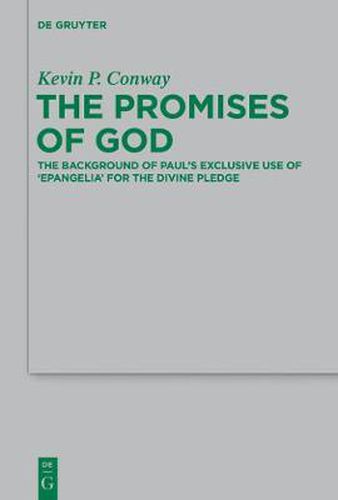Readings Newsletter
Become a Readings Member to make your shopping experience even easier.
Sign in or sign up for free!
You’re not far away from qualifying for FREE standard shipping within Australia
You’ve qualified for FREE standard shipping within Australia
The cart is loading…






This title is printed to order. This book may have been self-published. If so, we cannot guarantee the quality of the content. In the main most books will have gone through the editing process however some may not. We therefore suggest that you be aware of this before ordering this book. If in doubt check either the author or publisher’s details as we are unable to accept any returns unless they are faulty. Please contact us if you have any questions.
This study is the first to investigate why Paul makes exclusive use of ‘epangelia’ for the divine pledge when referring to the Abrahamic covenant, a usage of the term never found in the OT-LXX. After examining Jewish writings and Greek literature of the classical and Hellenistic periods, this study demonstrates that Paul is rather unique in his exclusive use of the ‘epangelia’ word group for the divine pledge and for using the term predominantly in reference to the Abrahamic promises. This exclusive usage is further deemed unexpected in that the'horkos’ and ‘omnymi’ lexemes are by far the terms most commonly associated with God’s promises to Abraham in the OT, the literature with which Paul was most familiar. The study then moves to explain why Paul has chosen this path of discontinuity, where it is argued that Paul’s exclusive choice of ‘epangelia’ for the divine promise is driven by its conceptual and linguistic correspondence with the ‘euangelion’, one of the terms Paul adopted from the early church that forms the core of his ministry. This conceptual word study of the divine promise will benefit Pauline scholars interested in Paul’s use of the OT as well as his association of the ‘euangelion’ and ‘epangelia’ word groups.
$9.00 standard shipping within Australia
FREE standard shipping within Australia for orders over $100.00
Express & International shipping calculated at checkout
This title is printed to order. This book may have been self-published. If so, we cannot guarantee the quality of the content. In the main most books will have gone through the editing process however some may not. We therefore suggest that you be aware of this before ordering this book. If in doubt check either the author or publisher’s details as we are unable to accept any returns unless they are faulty. Please contact us if you have any questions.
This study is the first to investigate why Paul makes exclusive use of ‘epangelia’ for the divine pledge when referring to the Abrahamic covenant, a usage of the term never found in the OT-LXX. After examining Jewish writings and Greek literature of the classical and Hellenistic periods, this study demonstrates that Paul is rather unique in his exclusive use of the ‘epangelia’ word group for the divine pledge and for using the term predominantly in reference to the Abrahamic promises. This exclusive usage is further deemed unexpected in that the'horkos’ and ‘omnymi’ lexemes are by far the terms most commonly associated with God’s promises to Abraham in the OT, the literature with which Paul was most familiar. The study then moves to explain why Paul has chosen this path of discontinuity, where it is argued that Paul’s exclusive choice of ‘epangelia’ for the divine promise is driven by its conceptual and linguistic correspondence with the ‘euangelion’, one of the terms Paul adopted from the early church that forms the core of his ministry. This conceptual word study of the divine promise will benefit Pauline scholars interested in Paul’s use of the OT as well as his association of the ‘euangelion’ and ‘epangelia’ word groups.